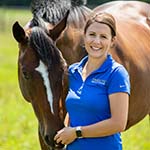You spend months pouring over pedigrees. You stalk photos and performance records of the offspring of the stallions that have made your list of contenders. You try not to add up all of the money you have spent getting your good mare bred, because, of course, she didn’t catch on the first two tries. You spend many a sleepless night watching the foal cam. You finally breathe a sigh of relief as the product of your dreams and hard work unwinds its spindly legs and staggers over to its mom for the first time.
The breeding business is not for the faint of heart. A lot of hard work, time, consideration and money goes into creating the next generation of horses, whether they are destined for the show ring, rodeo arena or trails. Yet, this is only the beginning of a horse’s journey.
Nutrition for proper growth and development starts long before the foal hits the ground. So far back, in fact, that nutrition can influence conception rates. But let’s assume that the mare has been on a well-fortified diet that was designed to support both her needs and the needs of the gestating foal.
What is Developmental Orthopedic Disease?
Getting the nutrition just right for the growing foal is a bit of a goldilocks situation. Too many calories, particularly if they come from starch and sugar, and horses grow too fast and are at greater risk of developmental orthopedic disorders (DOD). Too few nutrients, particularly certain trace minerals, and horses are also at greater risk of DOD. We are looking to find that balance of feeding enough calories to maintain a steady growth rate while providing all of the necessary non-energy nutrients to support growth.
Young foals will receive the majority of their nutrition through their dam’s milk. A low sugar/starch, nutrient dense feed that is appropriate for the mare’s calorie needs is required to produce high quality milk. Look to Growth, which is specifically designed for the lactating mare to provide these additional nutrients. Some mares are easy keepers, even during lactation, and are able to maintain their body condition on good quality hay. If you find that you are feeding under the recommended rate for your mare’s body weight, you will also be underfeeding non-energy nutrients which will in-turn impact the nutrition delivered to the foal via milk. A ration balancer, like Essential K® or Alfa Essentials®, can be used for easy keepers to bring in the nutrients required to support lactation without bringing in unnecessary calories.
While mare’s milk is the bulk of the young horse’s diet, it is not always sufficient to meet all of their nutrient requirements. For unthrifty or underweight foals, offer Foal Foundation™, a milk-based creep feed. Foal Foundation™ should be offered until 3 months of age to fill in any gaps not provided through the mare’s milk.
After 3 months of age, the foal will have developed the ability to digest plant-based protein and can be transitioned on to Growth. They will still continue to nurse but the mare’s peak production of milk will have passed and milk will become an ever-smaller portion of the foal’s total diet.
Some foals are easy keepers and feeding Growth at the minimum rate may cause excess weight gain or promote overly fast growth. In these cases, a ration balancer can be used to provide nutrients without excess calories for these foals. We will particularly lean on the use of these ration balancers for foals that are growing rapidly and experiencing physitis or other DOD in order to promote a more moderate rate of growth.
It is a common misconception that dramatically cutting back concentrate feed (grain) and feeding a low quality hay will promote DOD recovery. While we may look to cut some calories from these foals’ diets, we will look to increase the total nutrient density of the diet through a ration balancer and, in some cases, Advance™ Paste, a nutrient packed paste designed to rapidly replace depleted nutrients. It requires a severe calorie restriction to truly slow down growth, which is not recommended. A grass-hay fed with Essential K® is suggested to promote a moderate rate of growth.
Conclusion
Unfortunately, even with an absolutely perfect diet, some young horses will still experience DOD. This is because nutrition is only one of multiple factors that contribute to DOD. However, ensuring non-energy nutrient requirements are met while providing energy for growth through fat and fiber sources helps set the stage for proper growth.

